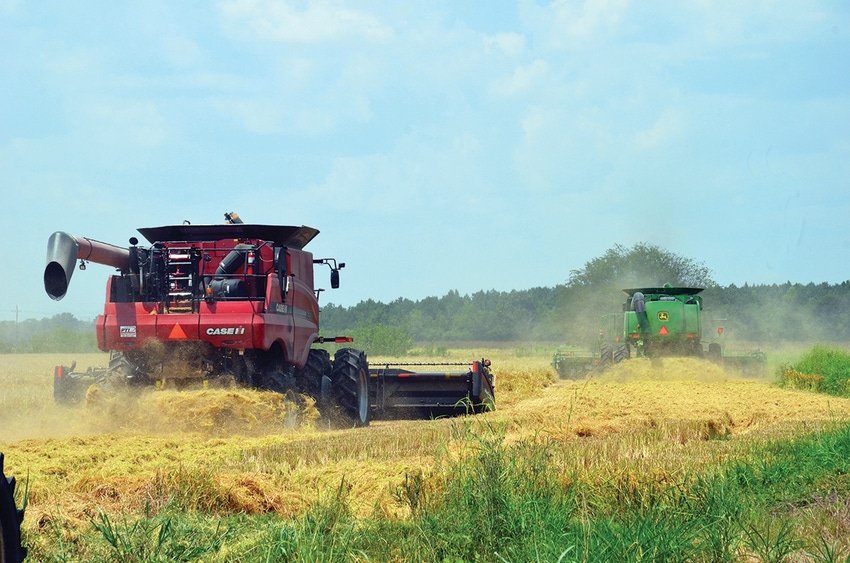
It’s been a little over a year since Ronnie Levy retired as the LSU AgCenter’s soybean specialist. What’s he up to now?
“I’ve moved into the Master Farmer coordinator position,” says Levy. “I retired after 38 years with the LSU AgCenter. The benefits-versus-retirement consideration tipped in the direction of stepping down. This gave me the opportunity to work with the Master Farmer program and allows me a transition from retirement to a part-time position rather than sitting home doing nothing most days.”
He is still living in south Louisiana’s Crowley and works from a nearby office at the LSU AgCenter Rice Research Station.
Master Farmer
The Master Farmer program kicked off “soon after the Clean Water Act of 1972 was enacted,” says Levy. “The program regulated point source pollution. At the time, our rice producers were releasing water from fields through drop pipes or cuts in the outer levee. There were concerns that they would be included in the permitting process of EPA and have to get water tested and a permit before water was being released from each field. You can imagine how popular that idea was.”
So, there was a lot of talk “about how Louisiana agriculture could reduce that impact and what producers could do proactively to address concerns of the Clean Water Act.
“Rice Growers, LSU AgCenter, NRCS, Louisiana Department of Agriculture, Louisiana Department of Environmental Quality, Farm Bureau, and Cattlemen Association came up with the voluntary Master Farmer program where producers make use of classroom educational material and best management practices to reduce nutrient and sediment loss.”
The state legislature also passed a law in May 2003 that a certified Master Farmer would be considered in compliance of state soil and water quality standards.
The belief was “producers would show good faith in reducing agriculture’s footprint on the environment, according to state law. It’s worked. Since then, there have been numerous studies showing reductions in impaired streams — looking at nutrient, sediments, oxygen and the like — and all the areas of Louisiana continued to be checked.”
Benefits
There are other benefits to sticking with the program, as well.
“Those who become Master Farmers are part of an elite group making environmental improvements. Producers develop a resource management system plan with NRCS to be in compliance. That plan identifies environmental concerns and develops a plan to reduce them under strict guidelines. After all concerns have been corrected, their plan receives approval.”
Some of the conservation funds, EQIP money, is actually put aside in a pool for Master Farmers, says Levy. “Those farmers also get preference points for their participation in the program. Those points give them a chance to have an edge in receiving funds to put conservation and environmental practices in place.”
How long does it typically take to go through the program?
“It depends. If they’ve got a situation where they’ve got land that is highly erodible or has other major environmental concern, it may take longer than farms that have already done major conservation improvements. So, it may take a few months or it could take several years to complete all three phases of the program.”
Sessions
The program makes use of three “phases” of training.
Phase One involves classroom sessions that occur periodically throughout the year.
The Phase Two producers “attend field days and look at conservation practices — cover crops, soil health, nutrient requirements, all the things to help a producer reduce impacts on the environment. The field days are a benefit because they allow them to actually see how a simple practice like cover crops helps keep soil in place during winter. Or, how some cover crops can make some nutrients more available to subsequent crops in a rotation? Or, the benefits of reduced tillage.”
Phase Three is where producers “actually develop and implement the resource management system plan. That’s done, as mentioned before, with NRCS experts.
“Once they complete the program, they’re awarded certification from the Louisiana commissioner of agriculture. That certification is good for five years. Once Master Farmers, they’ll need to continue to go to educational meetings to get continuing education credits.
“To be recertified they’ll also need to update their resource management system plan. It is a lengthy process, but it’s worth doing. Our program has a lot of support and is a model for others to follow. Producers are looking to be good stewards of the land and the environment while reducing the calls for more regulations.”
Right now, there are 241 Master Farmers in Louisiana. There are also 3,781 in the process of finishing the program, says Levy.
“Folks are welcome to contact me about this. I’d love to discuss Louisiana’s Master Farmer Program.”
The schedule
Phase One training:
June 26 — Rice Research Station, Crowley, 8:30 a.m.
July 10 — Scott Research Station, Winnsboro, 8:30 a.m.
July 12 — Louisiana Tech University, Ruston, 8:30 a.m.
August 16 — Hammond Research Station Conference Room; Hammond, 8:30 a.m.
October 10 — Natchitoches Farm Bureau Office, Natchitoches, 9:00 a.m.
October 18 — Dean Lee Research Station, Alexandria, 8:00 a.m.
Phase Two/CEC field days:
June 13 — LSU AgCenter Acadia/Rice Research Station South Farm Field Day (CEC only); South Farm-Rice Research Station, Crowley, 8:30 a.m.
June 19 — Scott Research/Extension Center Crop Expo and Field Day (Phase 2 and CEC), Winnsboro.
June 21-24 — Louisiana Farm Bureau Convention (CEC only); New Orleans.
June 27 — Rice Research Station Field Day (Phase 2 and CEC); H. Rouse Caffey Rice Research Station, Crowley.
July 18 — Sugar Station Field Day (Phase 2 and CEC), Sugar Research Station, St. Gabriel, 8:00 a.m.
July 26 — St. Mary-Iberia-Vermilion Sugarcane Field Day and Sugarcane Soil Health Conference (Phase 2 and CEC), Civic Center, Jeanerette, 8:00 a.m.
October 18 — Dean Lee Beef and Forage Field Day (Phase 2 and CEC), Dean Lee Research Station, Alexandria, 1:00 p.m.
For more information, contact Levy at (337) 785-5227 or (337) 581-4390.
About the Author(s)
You May Also Like




